-
The Power of the Resurrection
 Written by Abby Ramirez, volunteer with Iron Rose Sister Ministries in João Pessoa, Brazil
Written by Abby Ramirez, volunteer with Iron Rose Sister Ministries in João Pessoa, BrazilEvery Sunday when we celebrate the Lord’s Supper, we meditate deeply on the sacrifice that He made for us on the cross. When we take the bread and the wine, we remember all the pain and suffering that Christ went through. His death brings us sadness, but we stay in this state of emotion for only a few moments because our Lord RESURRECTED. He defeated death and saved us. His return to life brings us immense joy and peace. His death testifies to His love and His resurrection testifies to His power.
For us, Jesus Christ’s resurrection should be of utmost importance, even more to be celebrated than His death. It’s a fact that Jesus died and His body was resurrected on the third day. Let’s consider together what this event means for us.
In Philippians 3:10 (NIV), Paul writes about the power of Jesus’ resurrection, “I want to know Christ—yes, to know the power of his resurrection and participation in his sufferings, becoming like him in his death.”
Paul had different personal experiences with our Lord Jesus in his life of mission. The apostle lived to preach the gospel, and his understanding of the resurrection was deep. In this verse, Paul expresses his desire to know Jesus. To know our Lord goes beyond knowing about His historical life and teachings. To thoroughly know Jesus means to believe in the power of His resurrection.
Jesus defeated death, and this lets us experience the power of this sacrifice by participating in His suffering. Romans 6:5 says, “For if we have been united with him in a death like his, we will certainly also be united with him in a resurrection like his.”
If we believe the gospel, we will put Him on in baptism, buried in the water, and resurrected to eternal life, knowing that our life will not end with death, but we will be resurrected like Him in a glorified body when He returns.
Jesus says in John 11:25-26, “I am the resurrection and the life. The one who believes in me will live, even though they die; and whoever lives by believing in me will never die. Do you believe this?” The resurrection of Jesus powerfully demonstrates His divinity. He defeated death and showed His supernatural power. This event shows us that Christ is God.
His resurrection has the power to defeat death, which is the price of sin. When Jesus was raised from the dead, He defeated Satan and gave us the same power. Now we are no longer slaves to sin, rather we are more than conquerors in Jesus Christ.
But thanks be to God that, though you used to be slaves to sin, you have come to obey from your heart the pattern of teaching that has now claimed your allegiance. You have been set free from sin and have become slaves to righteousness. (Ro. 6:17-18)
His resurrection has the power to bless all nations without any kind of discrimination. Jews, Gentiles, and all people have access to salvation through Christ. His resurrection fulfills God’s perfect plan. The resurrection sealed the gospel and God concluded His plan of salvation for humanity.
In His wisdom, He planned it this way from the beginning and fulfilled it perfectly.
His resurrection has the power to justify us. It was the proof that the sacrifice of the cross was fulfilled and accepted. We were bought with the blood of Christ and the debt of our sin was paid in full. His resurrection has the power to give us life, which means that all of us who belong to Jesus Christ will receive the same resurrection.
Romans 6:8 says, “Now if we died with Christ, we believe that we will also live with him.” His resurrection has the power to comfort. It promises that our loved ones who have already died in Christ will live with Him.
Our Jesus was resurrected! He is alive! How many times a day do we remember this extraordinary fact? Do we understand the power of the resurrection of our Lord? Many Christians are still trapped in the grave without the hope of the resurrection, or only focused on the cross and the suffering. It’s good to remember and reflect on the death of our Lord Jesus, but we must not forget that He was raised. Let’s remember this important truth and consider what the power of the resurrection means for us.
Let’s tell others that Jesus defeated death. His body did not remain in the grave. Therefore, our faith should be based in this great truth of the resurrection. His resurrection was seen and testified by many. The resurrection of Christ gives meaning to our Christian life, as Paul says in 1 Corinthians 15:14, “And if Christ has not been raised, our preaching is useless and so is your faith.”
Let us rejoice in His resurrection!
-
The Resurrection of Jairo’s daughter
Written by Débora Amaro, volunteer with Ministério Irmã Rosa de Ferro in Campo Grande, Brazil
There are several accounts about Jesus where His divinity is expressed with great power, and I believe that resurrecting people is one of the biggest demonstrations of that. We have some biblical accounts, like the widow’s son in Nain (Luke 7:11-17), Lazarus (John 11), and Jairo’s daughter (Matt. 9).
But, for the moment we will focus on Jairo’s daughter. We don’t know her name, her age, or even what she looked like. The only information we have about her is her ancestry: she’s Jairo’s daughter. Let’s take a look at the whole history:
‘‘While he was still saying this, a synagogue leader came and knelt before him and said, “My daughter has just died. But come and put your hand on her, and she will live.”
Jesus got up and went with him, and so did his disciples [...]
When Jesus entered the synagogue leader’s house and saw the noisy crowd and people playing pipes, he said, “Go away. The girl is not dead but asleep.” But they laughed at him. After the crowd had been put outside, he went in and took the girl by the hand, and she got up. News of this spread through all that region. (Matt. 9:18-19, 23-26)This complex history demonstrates Jesus’ compassion for women and children, whom, most of the time, were undervalued during the first century’s Jewish society.
We know that Jesus has power to resurrect the dead. He was resurrected himself after the crucifixion and lives today at the Father’s right hand. But, one thing is knowing, reading and listening about it. It’s another thing to actually experience it.
And that’s where the mystery lies: We are not Jairo’s daughter, but we were also dead and we were also resurrected!
Look at how beautiful the reality of what Christ did for us is, in the words of the apostle Paul:
‘‘As for you, you were dead in your transgressions and sins, in which you used to live when you followed the ways of this world and of the ruler of the kingdom of the air, the spirit who is now at work in those who are disobedient.
All of us also lived among them at one time, gratifying the cravings of our flesh and following the desires and thoughts. Like the rest, we were by nature deserving of wrath.
But because of his great love for us, God, who is rich in mercy, made us alive with Christ even when we were dead in transgressions—it is by grace you have been saved.
And God raised us up with Christ and seated us with him in the heavenly realms in Christ Jesus, in order that in the coming ages he might show the incomparable riches of his grace, expressed in his kindness to us in Christ Jesus.” (Eph. 2:1-7)Like Jairo’s daughter, we didn’t have (at least not in any biblical account) a name or an identity.
And just like Jairo interceded to God on behalf of his daughter, Jesus interceded to God on our behalf.Just like they doubted the power of God during that time, they doubt God’s power to transform lives today.
Jesus knew there was hope for Jairo’s daughter, because He is powerful to bring LIFE, and HE knew there was hope for us also, through His sacrifice.
When Jesus says there was no reason for mourning, they laughed at Him. Those who doubt God’s power can laugh at us and at our faith, but they can’t contest a miracle: a life made new is a miracle!
This HIStory also speaks a lot about us: Christ has the power to resurrect! It’s incredible to know that the same power that resurrected Jesus lives in us today:
‘‘(...) and his incomparable great power for us who believe.
That power is the same as the mighty strength he exerted when he raised Christ from the dead and seated him at his right hand in the heavenly realms…” (Eph. 1:19-20)Is there something that our God cannot do? He already performed the greatest miracle ever, giving us new life.
God bless us!
#IronRoseSister #HIStories #resurrection #guestwriter
-
The Son of Man Came to Serve
 Written by Alessandra Cardoso, volunteer with Iron Rose Sister Ministries in Sergipe, Brazil
Written by Alessandra Cardoso, volunteer with Iron Rose Sister Ministries in Sergipe, BrazilWhen we stop to think the only begotten Son of God, who came into the world in human form, dedicated His entire ministry to healing, saving, and loving the people around Him, we realize His greatness. He, who is the heir of God the Father, renounced His glory to be among us. With humility and love, He fed hungry people, cured the sick, and healed the hearts of many, including those needing spiritual health.
Nowadays it is difficult for us to understand such gestures of care and service when we look at them from our earthly perspective, but Jesus' greatest purpose on Earth was this: “…just as the Son of Man did not come to be served, but to serve, and to give his life as a ransom for many” (Mt 20:28 NIV). Before delving deeper into this verse, I would like to define what the verb serve means: to work in favor of (someone, an institution, an idea, etc.).
Serving is a job, providing a service to something and/or someone, and may receive something in return (like a salary, for example) or simply be a voluntary act. In either case, serving is action. When examining the gospels, we observe Jesus Christ's attitude toward humanity; we see a lovable, docile, kind, compassionate, humble, and merciful man. However, when focusing within the gospels on the three years of His messianic ministry, we see that He proves His divine essence in the form of love and service.
There are countless ways to serve each other in the church of Christ— both our brothers and sisters in the church and those outside. We can actively participate in the congregation’s ministries (children, couples, benevolence, etc.), but we also have the opportunity to take part in the details that are not seen by the majority (preparing the Lord’s Supper, cleaning the building, maintenance, etc.), and we must serve with our wisdom, personal/professional experience, and advice. As Christian women, the range of services is diverse and each one can identify which one fits them best.
If we were to look for a source of inspiration and direction to follow, there is a perfect example of a SERVANT Jesus Christ, our Lord and Master (and by Lord, I mean that we are His slaves— He bought us at a high price). The interesting fact here is: our Lord is owner of the entire universe, Son of God, and our Savior. He became a servant in order to rescue and save many— to be an example for us to follow—because the disciple imitates his master. Therefore, if Christ submitted Himself to servitude willingly out of love for humanity, how can we, His disciples and slaves, not want to follow in His footsteps?
If we reflect deeply on our Christian duties, service is something indispensable for Christians. When done with sincerity and willingness, it has the potential to nourish our Spirit, strengthen interpersonal relationships, and improve our skills. Notably, it is also a huge gesture of love, obedience, and submission to God. When I think about service, I believe that the central point is LOVE, because if I am full of love in my heart, serving is not a burden, but rather a beautiful reflection of what we have within us: the overpowering light of Jesus Christ. Serving is loving. Whoever is full of love to give will certainly serve others with joy. Thinking further, all of this is the result of the fruit of the Spirit being developed and polished within each of us, day by day. It is the mission that Jesus left for us. It is and has always been His desire that serving was more important than being served. It denotes humility and subjection.
A beautiful example of how Jesus demonstrated that He came to serve and not be served is found in John 13:12-14 when Jesus washed the feet of His apostles. He teaches us about His character and, most importantly, gives us the precious lesson about humility connected to service. We often aim for big and flashy things in the church. However, as written in Mark 10:43, our goal should not be to have recognition and prestige— our goal is to simply be faithful servants of Christ Jesus!
I know in our Christian journey, we will have barriers to developing this service within the church. It will not always be the easiest or most fun thing to do. However, I want to encourage you to try. Start with something small and simple, and you can master easily. Remember that serving is: loving, imitating, and glorifying Jesus.
May we be servants of Christ. Amen!
-
The Surpassing Worth of Knowing Christ
 Written by Deanna Brooks, volunteer with Iron Rose Sister in Arkansas
Written by Deanna Brooks, volunteer with Iron Rose Sister in ArkansasIn Philippians 3:8-11 (ESV) Paul writes:
I count everything as loss because of the surpassing worth of knowing Christ Jesus my Lord. For his sake I have suffered the loss of all things and count them as rubbish, in order that I may gain Christ and be found in him, not having a righteousness of my own that comes from the law, but that which comes through faith in Christ, the righteousness from God that depends on faith— that I may know him and the power of his resurrection, and may share his sufferings, becoming like him in his death, that by any means possible I may attain the resurrection from the dead.In Luke 14:25-33, Jesus admonishes us to count the cost of being a disciple and closes with these words in verse 33, “So therefore, any one of you who does not renounce all that he has cannot be my disciple.”
Paul had a background to be proud of, but it meant less to him than knowing Christ. We read in Philippians 3:3-7 that he was…
“circumcised on the eighth day, of the people of Israel, of the tribe of Benjamin, a Hebrew of Hebrews; as to the law, a Pharisee; as to zeal, a persecutor of the church; as to righteousness under the law, blameless. But whatever gain I had, I counted as loss for the sake of Christ.”Paul was born in Tarsus and was a Roman citizen who studied at the feet of Gamaliel and probably was being primed to eventually become a well-respected religious leader. It is thought that because he had been educated by Gamaliel, his family was wealthy.
Paul held the garments of those stoning Stephen (Ac. 7:58) and approved the execution (Ac. 8:1), indicating he had some authority among Jewish leaders. He very likely was seen as one of their bright young leaders on the way to the top.
However, on the road to Damascus Jesus got Paul’s attention and changed his life.
When he made the decision to follow Jesus, he cut ties with his former life… with those with whom he had studied, with the religious leaders, and perhaps with his source of income.
The example Paul sets in seeing nothing in this world as being as important as following Jesus Christ tells us of his dedication and faith.
What holds us back from “knowing Christ”?
Sometimes it’s just the busy life we live. Other times it is the TV, sports events, or entertainment of the world. Time passes… our day gets away from us, and we have not stopped to pray, to read from Scriptures, or to meditate. We are concerned with our work, our car, the bills, or our house, and these take over our lives.
But Jesus once said that the Son of Man has no place to lay His head (Mt. 8:19-20).
Paul appears to be in a similar situation. He walked away from what he had, so he could teach others about Jesus. We have no record of him ever having a permanent home after becoming a follower of Jesus. He had no wife, and no children, but although he did have a sister and nephew (Ac. 23:16), he found a home with fellow disciples in his travels.
While living a nomadic lifestyle may not be something most of us can do, we can decide to put Jesus first in our decisions about things that occupy our time, how we spend our money, and how we treat others.
I encourage each of us to stop and think: Is there something that is keeping me from putting Jesus above everything on earth? Is there something I need to give up to truly make Jesus the lord of my life?
-
The Thessalonian Church’s Example
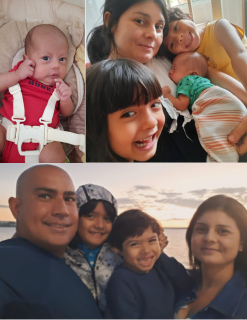 Written by Sâmia Machado, volunteer with Iron Rose Sister Ministries in Brasilia, Brazil
Written by Sâmia Machado, volunteer with Iron Rose Sister Ministries in Brasilia, BrazilWe remember before our God and Father your work produced by faith, your labor prompted by love, and your endurance inspired by hope in our Lord Jesus Christ. (1Th 1:3 NIV)
Dear ones, the church of the Thessalonians was a model church for all times. In 1 Thessalonians 1:1-10, we see the success of the gospel and the faithfulness of that church, being the fruit of Paul's work accompanied by Silas and Timothy on his second missionary journey (Ac 15:36-18.23). In these chapters, we see their choice to serve by working together to preach the gospel of Christ.
Over the last three years, I have been able to learn from the Lord the meaning of the word service. Being a servant of the Lord means standing before Jesus with the desire and willingness to genuinely serve. So, if our willpower is weak, we have to exercise it, even if our bodies and minds say they don't have the willpower.
Paul was called to be an apostle and serve the Lord Jesus, having to renounce a lifetime of Jewish customs. As a servant with no choice of where to go, facing persecution, and eventually imprisoned, he happily writes his first letter to the Thessalonians.
Sisters, my family and I have been “on rough seas” since 2021 during my third pregnancy. I was pregnant with twins and lost one of them, leading to an early rupture of the membrane protecting José, the baby I was still carrying. This situation put me in the hospital at 25 weeks pregnant. I was able to maintain the pregnancy until the thirtieth week when the amniotic fluid emptied. Unable to wait any longer, my baby had to be delivered and taken straight to the ICU. In total, I was in the hospital for two and a half months, leaving my home in the care of the Lord with the help of my beloved husband, Emilson, until we were able to go home with our José Victor. I realized how intense the last two months and six days were, when I saw our three children together after so many weeks of absence. Unfortunately, José passed away due to a respiratory syndrome, as a result of a simple cold.
For me as a mother, experiencing that moment of sudden loss made me realize that I should accept God's sovereign will. The desire to give up was intense, but what about my two children who were still with me? And my home? Being in mourning and having to return to work which involved the direct care of mothers and newborns — all of this was part of that rough sea…
Being in the desert of the ICU and seeing God bring my reinvigorated little baby out of there, then going back to the ICU for the second time and leaving without my son alive, returning without a piece of me, was the biggest battle I had to fight against my own will. I had to take care of the home, be a present mother, and start to take care of the family again with this loss. After a few months, I had to return to work assisting with breastfeeding care at the Birth Center where I have worked since then. ii. My dedication to my children, Alice and Benjamin, had to primarily be the continuation of discipling them in the Word of the Lord.
Today, two years and four months after my José Victor's departure, I am inspired by Paul's letters when analyzing the path he followed to serve the Lord. Paul wrote Thessalonians, his first letter to that church, with enthusiasm and love for service. Amid the persecution of the Christians there, he encouraged those new to the faith who, even amid difficulties, did not stop preaching the gospel. Even those who were new to the faith were active in serving the Kingdom, putting into practice the teachings learned from the missionaries.
I refer to each family as a part of the Lord's church, each one being a part of the body that, when joined together, forms the church just as Thessalonica was: an example of a healthy body. Like them, we should also be committed to the gospel of Christ both in our church and in our homes, in any situation, even if there is persecution as there was in the early church.
May we be like the Thessalonian church; active in serving, which was what distinguished it as a model church through the preaching of the gospel throughout Macedonia and Achaia (1Th 1:7-8).
…your work produced by faith, your labor prompted by love, and your endurance inspired by hope in our Lord Jesus Christ. (1Th 1:3b)
-
The Three Threads of Service, Hope, and Witness
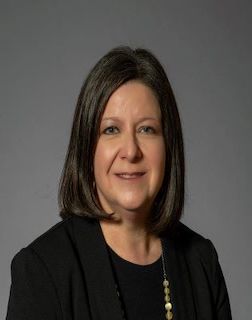 Written by Anessa Westbrook, volunteer with Iron Rose Sister Ministries in Arkansas
Written by Anessa Westbrook, volunteer with Iron Rose Sister Ministries in ArkansasIn Matthew 22:39, Jesus tells Christians to love their neighbors as themselves. Clearly, loving others is part of witnessing to them and this love can be seen through service. In Acts 9:36-43, we see the story of Dorcas. When she died, two men sought out Peter and asked him to come help. When Peter arrived, he was surrounded by mourning widows for whom she had made clothing. The need was clear; Peter was moved by this and raised her from the dead, allowing her to continue her service to the community.
This particular story is a clear example of the difference that someone can make in the lives of others. Were these women simply concerned about no longer receiving the clothing that Dorcas provided? Surely not! The detail of the two men coming to find Peter and asking him to help is an indication of the loss this community felt, and also that others perhaps felt at a loss to provide the help that was needed. The true gift that these widows received from Dorcas was something greater than merely a piece of clothing. Instead, Dorcas had provided both love and hope.
C.S. Lewis in Mere Christianity writes,
Most people, if they had really learned to look into their own hearts, would know that they do want, and want acutely, something that cannot be had in this world. There are all sorts of things in this world that offer to give it to you, but they never quite keep their promise. (p. 135)
In our modern society, we can help people see an alternate way of life and a Christian way of living that is in stark contrast to the world around us. Just as Israel and early Christians lived in a world needing hope, we, too, are surrounded by people who are desperate to fill the longing for hope that they feel in their souls.
In Ephesians 2:12, Paul reminds the Ephesian church that before they were Christians, when they were separate from Christ, they were without hope. He writes, “Remember that at that time you were separate from Christ, excluded from citizenship in Israel and foreigners to the covenants of the promise, without hope and without God in the world” (NIV). Sharing this hope is certainly the driving force behind our witness and ministry.
The Book of Hebrews was written to a group of Christians who were being persecuted; yet in Hebrews 13 they are not called to focus on their own troubles but to serve. Hebrews 13:1-3 says,
Keep on loving one another as brothers and sisters. Do not forget to show hospitality to strangers, for by so doing some people have shown hospitality to angels without knowing it. Continue to remember those in prison as if you were together with them in prison, and those who are mistreated as if you yourselves were suffering.
Just because the recipients of the letter to the Hebrews were suffering, they did not have permission to get out of service or witnessing to others. Instead, they were to focus on how they lived, their purity, doctrine, and on finding ways to help others. What a challenge for us today! Often, we are overly focused on our own struggles as Christians, but if we refocus our attention on how we live, our purity, understanding our faith, and service, this puts things into greater perspective.
In Matthew 6:25-34, Jesus teaches His followers not to worry about earthly concerns and problems. When Christians live this out, the lack of worry shows a confidence and hope that surpasses what many people will encounter in the world. This is attractive to a world that feels as if they have no hope. Showing that there is hope, and living day-to-day in a way that is different, is also an important part of our witness.
As Christians, we have both the responsibility and opportunity to show the world a different way of living, loving, and serving. Our hope in Christ is both the object and focus of our witness. Hopefully through our reflection on biblical hope, we can share with others the basis and potential of our hope.
- What are some specific ways that hope could affect and encourage our outreach to others?
- Hebrews 13:16 says not to neglect doing good and sharing, but what are the specific implications for the church if the majority of members were to neglect it?
- What are some specific areas in which you would like to see yourself more involved in helping the church, and what obstacles do you face in being able to do that?
-
The Writing on the Wall
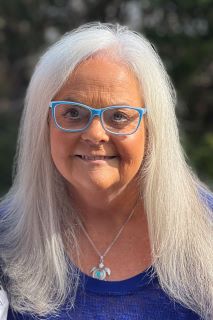 Written by Elesa Goad Mason, volunteer with Iron Rose Sister Ministries in Texas
Written by Elesa Goad Mason, volunteer with Iron Rose Sister Ministries in TexasPonder. To meditate and think with intent. Together with prayer, pondering can bring understanding of the ways of God.
It wasn’t until I became a mother that I really understood what the Bible meant when it said “Mary pondered…” There are moments in my children’s lives that I will never forget. Sounds of their voices that had meaning, requiring no words. Certain facial expressions. The innocent look as they slept with a slight hum when they exhaled. All etched in my memory because when I witnessed the beauty of my child, I deeply contemplated and pondered that moment; never wanting to forget the miracle of it all.
Forty years ago, I experienced the closest thing I’ve ever had to God writing on a wall to give me an answer to a deep and troubling question: should I or should I not marry? Making such an enormous decision to combine my life with another person forever brought me restless and sleepless nights. After one especially prayerful one, I felt drained and confused the next morning. I was puttering about doing a list of chores that were reserved for Saturdays. One of them was making a call to a number I didn’t know. In those days (1985) there were no cell phones or internet, so I grabbed a five-inch-thick book called The Yellow Pages. It was filled with ads for every business in the city of Denver. I stuck my thumb halfway through, opened it to a random page, and laid it on the table. I held my breath as my heart started beating rapidly in my chest.
Let me explain: to help navigate such a large conglomerate of advertisements, at the top of each page was the name of the first listing on that page, then a dash with the name of the last listing. After the prayerful night I had just experienced, my random toss had opened to “marriage-mason”. Let that sink in for a minute (and check out my last name)! The humorous side of me said, “ok God, how about two out of three?!”, but I cut out those two words and carried them in my wallet for over 20 years. Four children and four grandchildren later, this coming July will be our 40th Anniversary.
That was the last time God wrote on the wall for me. But there have been many other times that I had to search for ways to listen to what He was saying. Aside from all the typical means of listening to God: studying the Word, focused prayer with Him, and fellowshipping with Christians, I have found several other ways that help me feel the sense that God is speaking directly to me.
Music. I have written in previous blogs that music lifts my soul and comforts, inspires, and encourages me. You might question how God is speaking through the words of man, but frequently the right song will come across the radio at just the right time to fill my need. If that’s not God in control, then I don’t know what is.
Stillness. After I pray, particularly if I need comfort or direction from God, I find that sitting still can bring answers. After asking Him to help me, I owe Him a few minutes of thoughtful, quiet listening. The Psalmist said in 46:10, “Be still and know that I am God.” God wants me to know that He is strength. If He can protect His people (Israelites) from hostile forces, then I know He’s got me and my problems.
And finally, intentional listening. This is not the same to me as my quiet stillness. I am talking about listening to others and seeking out ways to treat my neighbor as myself. After all, that is the second greatest commandment according to Jesus (Mt 22:39).
Most of my deep connections have been with strangers, through whom I hear God when I actively try to listen. The thing about asking God for spiritual understanding and ways to be of greater service in His Kingdom is that He will always answer and present me with opportunities to show His love by making someone else’s way easier.
I promise if you fervently seek for ways to find Him, He will show you. He always does.
-
Think Small
 Written by Wendy Neill, Advancement Coordinator for Iron Rose Sister Ministries in Arkansas
Written by Wendy Neill, Advancement Coordinator for Iron Rose Sister Ministries in ArkansasI grew up in a thriving church of around 3,000 people. When I tell people that, they often say, “I don’t like big churches. It’s too hard to get to know people.” Yes, it is impossible to get to know that many people. Those who only come to a large assembly on Sunday morning don’t grow very much in their faith. That’s why it is important to “think small.”
GoodFaithMedia estimates there are about 2.6 billion followers of Christ in the world today. How did Jesus start this worldwide movement? One by one, and through small groups. While Matthew was sitting in his tax office, “Jesus said to him, ‘Follow Me.’ So he[Matthew] arose and followed Him” (Matt. 9:9 NKJV). He called out to Simon Peter and Andrew as they were going about their daily work of fishing. “Follow Me, and I will make you become fishers of men" (Mark 1:17).
Gradually, Jesus surrounded Himself with a group of disciples. We don’t know how many. After spending some time with them, He talked with His Father and made a focused decision.
One of those days Jesus went out to a mountainside to pray, and spent the night praying to God. When morning came, he called his disciples to him and chose twelve of them, whom he also designated apostles. (Luke 6:12-13 NIV)
With this small group of twelve, Jesus changed the world. He had other disciples who followed Him, including women (Mark 15:41), and He preached to and healed large crowds of people. But He gave special teaching, care, and insight to these twelve. He explained parables to them, He sent them out with miraculous powers, and He went through storms with them. He focused on the twelve because He knew they would each disciple others, even after He left this earth. And it worked. His teachings spread like wildfire.
Within that group of twelve, He had three that were His inner circle: Peter, James, and John. He kept them closest in His moments of need. When He knew His death was drawing near, He took those three up to a high mountain. They had the privilege of witnessing the appearance of Elijah and Moses, encouraging Jesus to remain strong and finish His mission (Matt. 17). On that dreadful night before He was betrayed into the hands of the Pharisees, He had a special “Last Supper” with all twelve. He prayed for them, gave them some final instructions in John 13-17, and took them to Gethsemane so He could pray for strength. But in that final stretch, He only took the three with Him.
We can follow this same pattern in our relationships. My childhood faith was nourished in that big church through small group relationships. Adults taught my fourth-grade class. A young couple taught us as seventh-grade girls. My youth group numbered 200, but I had a group of about twelve close friends. We served orphans in Jamaica, built a Sunday school classroom for a poor church in south Texas, and encouraged each other in our faith. As an adult, I have had small group studies with college students or other adults in my home. And I have two or three women that I can call any time to pray for me or to walk with me through a hard time.
There are so many ways that we can seek to be like Christ. One of them is to think small. Small groups allow you to share your heart and to get beyond the pleasantries.
Are you part of a formal or informal small group of Christians? Do you have three women in your life who help you grow? If not, I encourage you to seek out and cultivate those relationships with other disciples. They are your “Iron Rose Sisters”!
-
Through the Deep Valleys
 Written by Ann Thiede, volunteer with Iron Rose Sister Ministries in Arkansas
Written by Ann Thiede, volunteer with Iron Rose Sister Ministries in ArkansasAs we strive to be committed to Christ 24/7 in 2024, there may be some very bumpy roads and deep valleys ahead. Trusting Him and submitting to His will when the road is smooth with few twists and turns is far easier. Let’s consider two people in the Bible and how they responded: Joseph and Jesus.
Beginning in Genesis 37 through chapter 50, Joseph stands out: the eleventh of twelve sons, favored by his father, Jacob. Sharing dreams of his preeminence over the brothers increased jealousy and anger in their hearts. As a result, they grabbed him, threw him in a cistern, and sold him (deep valley) to traders going to Egypt. Even though sold again as a slave to one of Pharaoh’s officials (twist), the ruler sees Joseph’s quality and puts him in charge of his household. Tempted by his wife to go to bed with her, Joseph responds, “How then could I do such a wicked thing and sin against God?” (Ge 39:9b NIV). Her lies of abuse cause Joseph to be thrown into prison (bump). Some years later, Pharaoh appoints Joseph second in command when God reveals to him the meaning of Pharaoh’s dreams: Seven years of great harvest and seven years of severe drought.
Several years into the drought, the sons of Jacob travel to Egypt to buy grain to feed their families. Joseph recognizes them though they do not recognize him. Through intrigue and a great humbling of the guilty brothers, Joseph reveals his identity. They deserved prison or worse, but instead, Joseph responds with these words:
And now, do not be distressed and do not be angry with yourselves for selling me here, because it was to save lives that God sent me ahead of you…to preserve a remnant on earth and to save your lives by a great deliverance. (Ge 45:5,7)
These words spoken by Joseph, and his life portrayed in Genesis, clearly show a man devoted to trusting God and submitting to His will in spite of twists, turns, and deep valleys. The words above could also be a foreshadowing of the Lord Jesus Christ.
Before our amazing deliverance on the cross, Jesus agonized in prayer to God, asking Him three times: “Father, if you are willing, take this cup from me; yet not my will, but yours be done” (Lk 22:42). Scripture says His prayers were so earnest that His sweat fell like drops of blood on the ground (v. 44)! Jesus knew what was coming: extreme physical agony and the spiritual agony of bearing our sins (deep valley).
Before this event, throughout the Gospels, Jesus lived a life fully trusting His Father, God…
- Even when tempted by Satan right before His ministry began and after fasting 40 days (Lk 4: 1-13).
- Even when “many of His disciples turned back and no longer followed Him” (Jn 6:66).
- Even when betrayed by one of His chosen twelve disciples, Judas Iscariot (Jn 13:21-30).
- Even when disowned three times by one of His closest friends, Simon Peter (Lk 22:54-61) .
- Even when mocked, beaten, flogged, crowned with thorns, and nails driven through His hands and feet when crucified.
When Jesus was arrested, Peter in defense cut off the servant of the High Priest's ear. Jesus responded, "Put your sword away! Shall I not drink the cup the Father has given Me?" (Jn 18:11)
It is no easy thing to drink some of the cups we’re given in this life like serious disease, a broken marriage, betrayal by a close friend, losing a spouse or child, mental illness challenges, or seeing a family member pulled into addiction or unbelief. Our son was born with cancer, diagnosed at six months. Stage three. I came to the moment that Jesus did when crying out many times that my/our will be done: LIFE! But -eventually- I surrendered to His perfect will, come what may. And oh! The peace He gave! I could handle whatever happened. *
Please listen to these comforting words of Jesus. Take them personally:
Do not let your hearts be troubled. Trust in God; trust also in Me. (Jn 14:1)
Peace I leave with you; my peace I give to you…Do not let your hearts be troubled and do not be afraid. (Jn 14:27)
I have told you these things, so that in Me you may have peace. In this world you will have trouble. But take heart! I have overcome the world. (Jn 16:33)
What is your cup and how will you let Jesus help you through it?
*Our son lived, now 37.
-
To Love as Christ Did
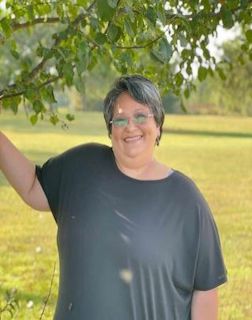 Written by Claudia Pérez, volunteer with Iron Rose Sister Ministries in Alabama
Written by Claudia Pérez, volunteer with Iron Rose Sister Ministries in AlabamaAs Christian women, our daily goal is to imitate Christ and walk as He walked, especially in the way that He loved, because this will reflect that we know God. So said the Master, “By this everyone will know that you are my disciples, if you love one another” (John 13:35 NIV). But how can we love as Christ loved?
Without a doubt, the meaning of loving as Christ loved is found in the book of John, “For God so loved the world that he gave his one and only Son, that whoever believes in him shall not perish but have eternal life” (John 3:16). The expression "so loved" expresses the magnitude of God's love, a love so great that even though we were sinners, our God sacrificed His only Son to die for us.
First of all, to love as Christ loved, we must understand that sacrifice is required. The Lord gave Himself as a sacrifice for us; His body was martyred on the cross of Calvary because He loved us. If you and I want to love as Christ loved, how do we imitate that sacrifice? The apostle Paul tells us: “Therefore, I urge you, brothers and sisters, in view of God’s mercy, to offer your bodies as a living sacrifice, holy and pleasing to God—this is your true and proper worship” (Rom. 12:1). Thus, this sacrifice consists of giving up ourselves and sacrificing our lives completely in the service of our God.
The Master also said, “Greater love has no one than this: to lay down one’s life for one’s friends” (John 15:13), and it is with that love that Christ loved us and gave Himself up. “This is how we know what love is: Jesus Christ laid down his life for us. And we ought to lay down our lives for our brothers and sisters” (1 John 3:16).
John 3:16 and 1 John 3:16 get my attention because of their similarity; in them I find the perfection of God in every way, showing us His great love and teaching us how to practice this great love towards our neighbors.
While it is true that today, while almost no one would die for any human being, we must understand that loving our neighbors requires sacrificing our desires and priorities for their good. The Master loved us not only by sacrificing His life and giving up Himself, but by enduring humiliation, and dying in the most humiliating way.
Who, being in very nature God, did not consider equality with God something to be used to his own advantage; rather, he made himself nothing by taking the very nature of a servant, being made in human likeness. And being found in appearance as a man, he humbled himself by becoming obedient to death— even death on a cross! (Phil. 2:6-8)
It is sad to see how we forget to imitate this way of loving when we allow there to be lawsuits between us, when we wrong our sisters, when we defraud our sisters, and let pride, revenge and injustice dwell in us. Many times, we think that forgiving or asking for forgiveness is humiliating. That thought is too often within us, and we forget about obedience to our God, and that love that was shown on the cross of Calvary. But this is not just a current problem; let's remember what happened in the Corinthian church. There were lawsuits among themselves, and they deceived each other and the apostle Paul exhorted them in this way, “Why not rather be wronged? Why not rather be cheated?”(1 Cor. 6:7b)
Let us not allow Satan to gain advantage in our lives and tempt us to do wrong, knowing that God will exalt us on that day, and we will be obeying the greatest commandment,
Jesus replied: “Love the Lord your God with all your heart and with all your soul and with all your mind” This is the first and greatest commandment. And the second is like it: “Love your neighbor as yourself.” (Matt. 22:37-39)
To love as Christ loved is sacrifice, surrender, obedience, humiliation, suffering, and dispossession. It is giving our lives to the service of God and our sisters. My sisters, let us love as the Master has given us an example. If you have not yet given your life to the Lord, you have not allowed that love to take effect and be reflected in your life because you have not known God, and God is love.
To love as Christ loved is to give our lives unreservedly to God, but it is also to love our fellow man as ourselves. Are you willing to imitate the Master's love? Are you willing to love as Christ loved?
-
Toxic Relationships
 Written by Elina Vath, volunteer with Iron Rose Sister Ministries in Ohio
Written by Elina Vath, volunteer with Iron Rose Sister Ministries in OhioI have tried to sit down and write multiple times. I’ve questioned what on earth possessed me to choose the topic of “toxic relationships: personal application” even more. I wouldn’t call what I’m feeling “writer’s block” because it’s more of a “writer’s paralysis.” Describing what God has taught me through my experience with toxic relationships means digging in holes that are filled in and covered with grass. It means going to places where I never wanted to return.
But Jesus. My mind goes to Him.
Jesus doesn’t get to forget His relationship with those knowledgeable men in fancy robes who were supposed to back Him up and demanded He be murdered instead. He doesn’t get to forget that one of His closest friends sold Him out for a small satchel of coins. Rather, Jesus ensured that these toxic relationships are documented multiple times, by multiple people—and preserved over the centuries for millions to know.
The pool of evidence that Jesus was on the receiving end of toxicity from those around Him is extensive.
No one knows narcissism, manipulation, deceit, and treachery like Jesus. Those of us who have front-row experience with any or all of these forms of dysfunction can claim that the One we follow knows exactly how it feels. We serve the God-man who sees our suffering, the betrayal, and the hurt, and empathizes. If nothing else I write about gives comfort, let this be it: When we approach Him in prayer, talk to Him, and pour our hearts out to Him, He feels our pain and then promises to give us peace that is beyond understanding.
But what about me?
We live in a fallen world where we are constantly navigating toxicity in our relationships. And none of us are guiltless of exhibiting toxic behaviors. We have all said or done things of a toxic nature. Maybe you were the instigator, maybe you were reacting to something that hurt you. Whatever the situation, identifying your own toxic traits is a huge part of the healing process. I can say for myself that growing and deciding, “I’m not who I used to be,” has been empowering. So, embrace the power of God to transform you, and relish in being someone different now—someone who resembles Jesus a little more.
But they haven’t changed.
There are times when toxic relationships cannot be cut out of your life entirely. When this happens, the healing process will happen again. And again. And again. Because the hurting, manipulation, etc., will not stop. But remember, you have changed. You see through the toxicity. You have changed the patterns of your behavior. You don’t process the daggers the same way you used to, and they don’t have the same effect on you anymore. Don’t let the repeated negative experiences wear you down. Instead, see them as opportunities to get stronger, to build your character. You will see that, in time, the healing will come more quickly.
But I’m weak sometimes.
I hear you, sister. We’ll both take steps back. We’ll both have moments when we revert back to the way we used to be. But hang on. You’ll get better at catching yourself. Laying your weakness at God’s feet means He’ll give you what you need in exchange. Don’t get discouraged in moments of weakness. God doesn’t run out of mercy and grace, and He loves it when you come to Him for help.
My heart goes out to you. I’m sorry you’ve been hurt. Cheering you on as you heal!
-
Trust and Obey
 Written by Rianna Elmshaeuser, volunteer with Iron Rose Sister Ministries in Colorado
Written by Rianna Elmshaeuser, volunteer with Iron Rose Sister Ministries in ColoradoChristian movies often end with the characters, who have trusted and obeyed God despite the circumstances, getting everything they want: a baby, a spouse, money, whatever. I’m not criticizing those movies because that frequently does happen, but it also doesn’t always happen that way. What do we do when we don’t get everything we want? Is it worth it? I can tell you from the perspective of someone who didn’t get the desires of her heart, it is still worth it to trust and obey God.
All my life I have loved kids. I so badly wanted my own kids to hold and sing to and teach and watch grow up. Unfortunately, I never married. I could not afford adoption or a residence big enough to appease the State requirements for a foster child. So here I am, age 40 and skipping all the church baby showers because they are just too painful. Along the way, I received more than a few recommendations to go to a sperm bank (use a donor) and have a baby by myself. But I had a problem with that. I believe God designed the family to have a mother and a father. And as badly as I wanted to be a mother, I felt that if I went around His plan and intentionally brought a child into a fatherless home, I would be disobeying God. Just because you can do something doesn’t mean you should. Taking in a foster child was an exception in my book because I was not the one who brought them into the world. They are kids that don’t have anyone to love them, and one person would be better than none.
To most of society, this is a crazy position to take. I connect deeply with Hebrews 11:13, “All these people were still living by faith when they died. They did not receive the things promised; they only saw them and welcomed them from a distance, admitting that they were foreigners and strangers on earth” (NIV).
My obedience to God may not bring me what I want, but I trust in God with all my heart that His way is better than mine. I am not single by my own design, but I have found 1 Corinthians 7:34 to be true: “An unmarried woman or virgin is concerned about the Lord’s affairs: Her aim is to be devoted to the Lord in both body and spirit.” My singleness and childlessness have given me time to help with the youth group, coach the kids in puppet ministry for Lads 2 Leaders, start a singles ministry, volunteer at nursing homes and other places, make time for lunch or coffee with people who need encouragement, and many other things that bring about a sense of fulfillment.
I have learned to embrace my status in life and trust that God has a plan for me because of Jesus’ example. He trusted His Father, our Father, to the point of death. When Jesus was in the garden, He was praying for God to find another way, to take the cup from Him. But in His perfect obedience, He said, “Not my will, but yours.”
As badly as I want children, I am trusting God’s plan even though I may never see the results in my lifetime. Hebrews 3:7-8 says, “So, as the Holy Spirit says: ‘Today, if you hear his voice, do not harden your hearts as you did in the rebellion, during the time of testing in the wilderness’.” Everyone at one time or another faces a choice to obey God or do their own thing. I had a friend in college who rebelled, had two kids while unmarried, and then repented and came back to the Lord. The thought did cross my mind that I could do that too. But trusting in God means also trusting that the consequences for rebelling to get what I want and then repenting will not be better than if I obeyed Him in the first place.
During my time of testing, I did not rebel, but did my best to emulate Jesus and say, “I don’t understand, but Your will, not mine.” Through the pain and sorrow, God has made changes in my heart that I could never have imagined possible. I have a light in my heart that I didn’t know was missing and a relationship with Jesus that is deeper than ever before. He has also set me on a path to help lots of hurting kids rather than my own. I am excited for the future. Despite the likelihood that there will always be times I don’t understand, and I will still mourn the children I never had, I trust my Father to bring about something better.
-
Truth and Lies About Self-Discipline
 Written by Melanie Curtis, volunteer with Iron Rose Sister Ministries in Arkansas
Written by Melanie Curtis, volunteer with Iron Rose Sister Ministries in ArkansasWhat is self-discipline, and why is it so important? The Oxford Dictionary defines self-discipline as “the ability to control one's feelings and overcome one's weaknesses; the ability to pursue what one thinks is right despite temptations to abandon it.” For as long as I can remember, I have always had what I thought was a “motivation problem.” I have struggled as a chronic procrastinator and avoider of hard problems. A friend shared a concept with me that revealed that the real problem is a lack of self-discipline, not a lack of motivation.
We will not always feel motivated to do the right thing or to complete all of our tasks every minute of every day, but if we turn those tasks into habits, one by one, we are exercising self-discipline, which makes it easier to do what needs to be done even when our motivation is low.
What are some temptations you face? Do they make you want to do what you shouldn’t, or do they make you want to not do what you should (Romans 7:15-25)? Self-esteem issues, selfishness, laziness, addictions, and more can keep you from fulfilling your goals and God’s goals for your life, but those struggles can be combatted with self-discipline.
What does Jesus say about self-discipline?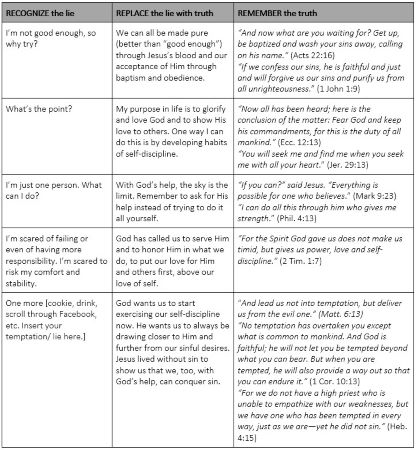
Let us ask God to help us turn good tasks into habits-- into a strong self-discipline muscle that we use every day to honor him at home, at work, and most importantly, in the Kingdom of God.
-
Unequally Yoked
 Written by Francia Oviedo, Creative Assistant for Iron Rose Sister Ministries in Honduras
Written by Francia Oviedo, Creative Assistant for Iron Rose Sister Ministries in HondurasI remember sitting in a park with all my friends. It was common to sit there to chat, laugh and although it seemed innocent, sometimes laugh at others. We used to have conversations that were not very useful or profitable. But one day something different happened; I realized that, unlike my friends, I was already a Christian, I had given my life to God, and I was unequally yoked.
But what is a yoke? Imagine a piece of wood with an arch carved out on each end. The head of an animal--generally an ox—is fitted in each arch, and when they are prodded by the tiller of the plow, they will pull the yoke to plow the field and create furrows in which seed will be planted. These furrows must be consistent in depth and spacing because if they are not, the seed will not be able to grow properly. This is why it is important that the two animals that are yoked together are of equal size and strength because if not, the crop will not grow properly and, above all, the animals could hurt each other if one of them pulls the yoke with more force than the other. In the Old Testament we find this verse, “You shall not plow with an ox and a donkey together” (Deut. 22:10 NASB).

So, then what do we call an unequally yoked relationship? A marriage relationship where one of the parties is not a Christian is commonly called an unequally yoked union, but I believe it goes much further than that. I think it is an issue that we must constantly pay attention to. Being unequally yoked can also apply when our lives are being influenced by worldly beliefs, cultures, ideas, ideologies, etc. where the will and holiness of God does not reign. Many times, we let these things guide our way of thinking and behaving and we end up unequally yoked, forgetting God's will for us.
Going back to my story, after giving my life to God and deciding to change my way of living and my way of speaking and expressing myself, I continued walking around with my friends who continued doing the same things that I no longer wanted to do. That day in the park while everyone was having a conversation and laughing at a boy who was passing by, saying things that had no purpose for me, I understood that that was no longer where I needed to be, and I decided to leave this environment and these companions. As 1 Corinthians 15:33 says, “But don’t be so naïve—there’s another saying you know well—Bad company corrupts good habits" (The Voice). I really liked enjoying time with my friends, but it was no longer a place for me.
With this, I am not saying that we have to abandon friends, a partner, a job, or a project, but it is about understanding and respecting our purpose of keeping ourselves in the will of God. I believe that when we demonstrate this firmness, which of course we must do with a lot of love and respect for others who do not believe in God, we can show the light of Jesus and we can become references for them when they need God.
As for my friends, I can say that, although I distanced myself a little from them and that unhealthy environment, I continued to be in regular contact with them, since I also know that my purpose is to share the message of God, trying to be a light for them, while always guarding my heart.
And well, I already told you what I had to give up, and I assure you that there are things that I must be constantly evaluating in my life: what conversations do I have, what music do I listen to, what videos or series do I watch? I must constantly check my heart and analyze what I am unequally yoking myself to.
And you, what relationships, conversations, movies, books, ___________ (fill in the blank with your challenge) are you unequally yoking yourself to? I encourage you to put those things in God’s hands in prayer. May He always help you guard your heart and not be unequally yoked.
-
We Are a Whole
 Written by Liliana Henriquez, volunteer for Iron Rose Sister Ministries in Colombia
Written by Liliana Henriquez, volunteer for Iron Rose Sister Ministries in ColombiaI don't know what has happened lately, but I have felt that the world has accelerated, and we are living life at high speed like "X2" in WhatsApp audios. On the one hand, it has been wonderful because we have managed to do many things in less time. Technology has helped us a lot and has made knowledge available to everyone. So there are no more excuses to grow and improve in any area of our lives. But, on the other hand, we live so fast-paced that sometimes, we forget to enjoy the moment and be grateful for the blessings that God is giving us day by day.
Today I want to focus on the positive side of this acceleration, and one of the things I love about this era is globalization. Geographical barriers are no longer obstacles to communicating and connecting with one another anywhere in the world. We already see our individual selves as a whole. We have normalized different time zones and cultures. We have friends and clients all over the world, and we feel they are super close thanks to video calls or Zoom meetings.
Another positive aspect of globalization is everyone's access to the Gospel. People are recognizing the need for Christ. We have seen it in the lives of artists and famous people who have publicly shared their faith journeys and inspired others to make the decision to accept Christ and obey the Gospel. That makes me very happy!
I feel that more and more people are using their platforms or channels of influence to impact the world positively, making Christ better known and giving relevance to the spiritual area. We are exercising our freedom in the right way.
Though I am free and belong to no one, I have made myself a slave to everyone, to win as many as possible. To the Jews I became like a Jew, to win the Jews. To those under the law I became like one under the law (though I myself am not under the law), so as to win those under the law. To those not having the law I became like one not having the law (though I am not free from God’s law but am under Christ’s law), so as to win those not having the law. To the weak I became weak, to win the weak. I have become all things to all people so that by all possible means I might save some. I do all this for the sake of the gospel, that I may share in its blessings. (1Co 9:19-23 NIV)
Christ is not religion. He is a relationship and a lifestyle. It should be noted that we are disciples of Christ not only in the church but in our work, friendships, relationships, etc. It doesn't make sense to be a Christian in select specific areas or places. We are a WHOLE; soul, mind, and body, and we must be coherent and congruent with what we profess. If we are Christians, we must act as Christians in our daily lives. In this way, we can put into practice one of my favorite phrases: "Preach the Gospel at all times, and if necessary, use words" (St. Francis of Assisi).
We were called to make Christ known at every moment. This is the good news that this fast-paced world needs!
-
What a Listening Spirit Produces
 Written by Claudia Malaquias, volunteer with Iron Rose Sister Ministries in Minas Gerais
Written by Claudia Malaquias, volunteer with Iron Rose Sister Ministries in Minas GeraisThe ability to listen is a precious talent, often underestimated in a world where communication is generally understood as speaking. However, true wisdom and understanding come from the ability to listen with an open heart and mind. The biblical passages of Matthew 15:10 and Proverbs 1:5-6 provide a solid spiritual foundation for understanding a listening spirit's profound impact.
In Matthew 15:10, Jesus says, "Hear and understand” (ESV). These words are a direct call to the importance of listening carefully. Jesus often taught using parables, requiring the audience to listen carefully and thoughtfully to capture the true meaning of His words. This form of communication highlights that listening is not simply a passive act, but an active practice of understanding and internalizing the message.
Proverbs 1:5-6 adds to this idea, stating, "Let the wise listen and add to their learning, and let the discerning get guidance for understanding proverbs and parables” (NIV). This verse suggests that the listening process is continual and essential for growth in wisdom. By listening, we gain not only knowledge but also the ability to apply that knowledge practically and effectively in our lives.
In my personal experience, adopting a spirit of listening has significantly transformed my relationships and my spiritual walk. I remember a time when I was facing a professional dilemma. Instead of acting impulsively, I sought advice and dedicated myself to listening carefully to more experienced colleagues. This practice not only helped me make a more informed decision but also strengthened my relationships in the workplace. The act of listening created a space of trust and mutual respect.
The habit of listening is also crucial in our family life. There are times when the people we live with (husband, children, siblings, etc.) need someone to listen to them without judgment or interruptions. By practicing active listening, we demonstrate love and empathy, which strengthens our bonds. I have learned that often solutions to problems arise not necessarily from what I say, but from the way I listen.
In the spiritual context, a spirit of listening also results in a deepening of our relationship with God. When meditating on the Scriptures and prayers, listening to God's voice requires silence and attention. There are times when the answers to our prayers do not come immediately, but through an ongoing process of listening and reflection.
Finally, a spirit of listening promotes humility. We recognize that we do not have all the answers, and that wisdom can be found in the experiences and knowledge of others. This recognition makes us more open to learning, and as a result, generates spiritual growth stimulated by the Scriptures (Heb 5:11-14; Pr 1:5-6; 1Pe 2:1-3; Col 1:9-10).
We can then distinguish some advantages of effective listening:
- Humility: Recognizing that we don't know everything and that others can offer us valuable knowledge and perspectives.
- Self-control: Practicing active listening requiring patience and the ability to control impulses to speak or interrupt.
- Openness to Criticism: Being willing to listen to constructive criticism and feedback as an opportunity to grow and improve.
In conclusion, what a listening spirit produces is transformation. It transforms our relationships, our spiritual understanding, and our personal growth. Matthew 15:10 and Proverbs 1:5 remind us that listening is more than a physical act; It is an exercise in wisdom and understanding. By cultivating a spirit of listening, we not only honor God, but we also position ourselves to receive His blessings and guidance more fully. In a world full of noise and distractions, choosing to listen carefully is an act of faith and wisdom that bears abundant fruit in all areas of our lives.
-
What Does Total Commitment to God Look Like?
 Written by Kathy Reagan, volunteer with Iron Rose Sister Ministries in Arkansas
Written by Kathy Reagan, volunteer with Iron Rose Sister Ministries in ArkansasGod’s Word has many examples of women who were completely committed to God, and it will bless us to take a look at their lives and choices.
Matthew 27:55-56 (ESV) says that “many women” followed Jesus, and it names three in particular who ministered to Him, following Him from Galilee. Also in Luke 8:1-3, two more names pop up—along with the phrase “many others”— and it says these women, who followed along with Jesus and His disciples as they traveled from town to town, “provided for them out of their means.”
The mother of the sons of Zebedee is named, and what we know about her is that her husband owned a fishing business and James and John were her sons. Mary, the mother of James and Joseph, may have been Jesus’ mother. Mary Magdalene is mentioned, out of whom Jesus had driven seven demons. Joanna, the wife of Herod’s household manager, is also named, along with Susanna.
What did these women give up to follow Jesus?
Do you think they (and the many other women with them) had comfortable homes back in their hometowns? Possibly. Did they leave their families, their comfortable beds, and their familiar environments to follow Jesus along dusty roads into strange towns and villages to hear Him teach, and to provide His meals and other necessities out of their personal money? Yes.
They “walked by faith, not by sight” (2Co 5:7). Traveling was difficult in those days! No airplanes, trains, or cars. And for these people of limited means, horses or donkeys were not even an option. They walked anywhere they needed to go—slow, physically challenging, and dusty roads. Why? Because they “trusted in the Lord with all their hearts” (Pr 3:5). They were not choosing the comforts of this world; they were boldly stepping out of their comfort zones on faith—traveling to places they had never been, unsure of the reception they would get, not knowing when they would get to go back home. But they knew one thing: Jesus was with them! When was the last time we stepped out of our comfort zones for Christ?
They focused on Jesus, not allowing this world and its distractions to get in the way. Colossians 3:2 tells us to “Set your minds on things that are above, not on things that are on earth.” They followed Him from town to town, drank in His teachings and His example, focusing on Him and not on what they were missing back home.
I’m reminded of the song we sing called, “Turn Your Eyes Upon Jesus.” It says, “Look full in His wonderful face. And the things of earth will grow strangely dim in the light of His glory and grace.” It is so true! Whatever we focus on becomes bigger. I know it may have been easier for these women to absorb Jesus and His teachings, hearing it from His own mouth, than it is for us now. But we do have His Words handy at our fingertips at any time of day. We need not travel hard every day to hear His teachings. It is just a matter of opening the Book. Do we drink in Jesus’ Word in our lives daily, like they did?
They put Him first in their lives. You know that as they followed Jesus, they heard Him teaching this: “Seek first His kingdom and His righteousness, and all these things will be added to you” (Mt 6:33) (referring to earthly necessities).
These righteous women were actively choosing God’s will over their own every day. They were traveling a hard road daily, sleeping in tents in a different place every night, spending their money to buy food and necessities for Him and His disciples so they could be with Him and learn from Him. They were following His example (even if not realizing it yet) from Luke 22:42, “Not my will but Yours be done.”
In what ways can we choose to put Jesus first in our lives today?
The excellent examples of these women who followed Jesus along the road can bless us today, as we see what their total commitment to Him looked like.
Sisters, I think it will bless each of us to ask ourselves a few simple questions, as we reflect on the wonderful examples these women left us.
What are we willing to give up to follow Jesus? Are we willing to step out of our comfort zones in faith for Him? Do we choose to focus on Jesus every day? Is “Not my will but yours” our standard in everyday life?
-
What I Have Learned as a Student of Relationships
Written by Lisanka Martínez, volunteer with Iron Rose Sister Ministries in Venezuela

“As iron sharpens iron, so one person sharpens a friend.” (Prov. 27:17 CEB)
We were created to be in relationships and to learn from those relationships.
It is undeniable that we are influenced by, and can influence the other people on our relational map. In this world, relationships are often complicated. Both in the family environment, as well as at work, in studies, and in the community, there will be differences, rivalries, and communication failures, among other things, that can make relationships complicated.
In the church body, we also learn about relationships, of course, with a different focus than the rest of the world. Once in Christ, even the most obstinate of human beings learns that we must love everyone, relate to all kinds of personalities, accept them, and treat them with love, as well as correct and be corrected with love. It is more difficult for some than for others. Depending on the temperament of each person, the change may be greater or less.
In my case, I grew up in a large family where most of them talked a lot, and with a loud and strong tone of voice. I, on the other hand, was quiet and limited myself to listening, expressing my opinion only if they asked me to. This distinguished me from others during my childhood and adolescence. I had few friends with whom I could express myself more openly; this caused some misunderstandings and embarrassing situations that only led me to become more withdrawn. Later, while I was studying Social Work, I began to express myself more in my relationships, both at school and with friends, but in my family relationships, I made little progress.
I learned a lot more about the exchange in relationships during my college years and in my working life. However, it wasn’t until I became part of the church that I learned so much more. I continue to learn about interpersonal relationships and the fact that God did not create us to be alone. His word says, “Two are better than one” (Eccl. 4:9 NIV).
When we are guided by the word of God and learn both from the examples of the relationships that had bad outcomes and from the ones that are good examples for believers, we can choose which path we will follow. When we understand the fruit of the Spirit and all that it generates in us, we will want to make an effort to develop it in our lives.
Likewise, when we see a brother or sister who, despite the adversities they are suffering, is ready to advise or help us, or when we understand that the sister who criticizes or judges also has faults and is as human as anyone, or when we see that sister who persists in her pride and maintains her opinions, believing herself to be wiser and less sinful than others (we may also see ourselves reflected in her conduct), we find that everything is part of God’s divine plan. Because we are blessed with His grace, every day we must try to keep the flame of brotherhood and friendship alive, despite our own mistakes or the mistakes of others. We learn that God's love is incomparable, and is what we must imitate, just as brother Paul advises when he says,
Do nothing out of selfish ambition or vain conceit. Rather, in humility value others above yourselves, not looking to your own interests but each of you to the interests of the others. In your relationships with one another, have the same mindset as Christ Jesus.(Phil. 2:3-5)
Let us try to achieve this in our relationships, not only with our sisters in faith, but also with each person who crosses our path and with whom we can share the glorious love of our Heavenly Father through the gospel of salvation along with a good deed or kind gesture.
Would you like to follow the example of our Lord Jesus Christ in His relationships?
What can we learn from each relationship with our brothers and sisters in Christ?
Are we applying that learning and that same attitude in our secular lives?
How can we improve our intra-family relationships?
May God bless us and help us reflect His peace and love every moment in all our relationships.
#IronRoseSister #teachthroughrelationships #learnthroughrelationships #learnfromothers #blog #guestwriter
-
What it Looks Like to be Clothed with Christ Today
 Written by Amy Mathis, volunteer with Iron Rose Sister Ministries in New Mexico
Written by Amy Mathis, volunteer with Iron Rose Sister Ministries in New Mexico"I have been crucified with Christ. It is no longer I who live, but Christ who lives in me. And the life I live in the flesh, I now live by faith in the Son of God, who loved me and gave himself for me." (Gal 2:20 ESV)
On May 21, 2006, I was baptized at a church in the place that I lived in at the time. My oldest daughter was also "dedicated" on the same day. My baptism happened in the local YMCA because the church did not have a baptistry. (The church met in an old storefront.) I was a part of a mass baptism. I was baptized with two other people. When they attempted to put me under the water, they had to kick my legs from under me to get me submerged. That day after I was baptized, I did not feel any different: I didn't feel happy, I didn't feel joy, I just felt the same as I did before. As I later realized, I did not die to self or put on Christ. After that, I went to the same church for a while, but I just got burned out by being there. They were using me as an event coordinator, their "errands girl." So, I left. After leaving the church I went to other churches in the area, but I didn't feel loved, accepted (I was a single mom at the time), or fulfilled in God's Word. So, in short, I stopped attending church altogether.
Fast forward a lot of years later; years filled with a marriage, a miscarriage, a rainbow baby, several moves, the loss of loved ones, and a lot of life's ups and downs. I landed in Mayhill, New Mexico, after my husband accepted a preaching job at the Mayhill Church of Christ. We felt at home in the little mountain church. A year after we started at Mayhill, Troy and I attended a Soul Winning Workshop, in a town near Mayhill. During the workshop, they had us conduct an activity on how to win souls for Christ. During the activity, we "role played" a situation in which we talked about baptism. We asked each other if we were and if so, how we were baptized. My husband explained his baptism and I went on to explain mine. That was when I started to question my life in Christ. "For as many of you as were baptized into Christ, have put on Christ" (Gal 3:27 ESV). I did not feel like I had put on Christ back in 2006. After some prayer, getting more involved in the church, and soul searching, my baptism was heavy on my heart and in the back of my mind.
I was told about Higher Ground Ministries, and their upcoming spring retreat in March of this year. I thought about going, but first I had to do some research. After learning about them, I decided to go. It was one of the best decisions I have made. The ladies there made me feel loved, wanted, and accepted. They did not care that I was a preacher's wife. I was Amy, a child of God. During some of the talks on the first full day of the retreat, I was thinking about my baptism again.
After some prayer, I made the decision to be re-baptized. I did not tell anyone that night; I waited until the following day. First, I told my oldest daughter, Victoria, then I told my Heartfelt "mom" Ruth, my husband, Troy, and finally my Higher Ground "big sister," Andrea. Then it was announced to everyone at the retreat. At that moment, I could feel my Savior's arms around me. I told my husband that I wanted him to baptize me. We decided to do it during our afternoon service that Sunday. Once I got home from the retreat, we headed to the church. At 1:30 pm on Sunday, March 24, 2024, I died to self in the waters of baptism, and I put on the love of Christ! I felt so happy, loved, wanted and most of all, I now know that I am a true child of God, and I will never be the same again!
Statement from Iron Rose Sister Ministries: We rejoice with Amy in her decision to die to self, be united with Christ in His death, burial, and resurrection, and be clothed with Him. We respect her decision to commit her life more definitively to Christ. This blog post is insufficient for telling her whole story. And only God and Amy truly know all the details.
A blog post from last month details what it means to be Clothed with Christ in Baptism.
We are sharing Amy’s story and rejoicing with her being clothed with Christ. If you would like to discuss Amy’s testimony or any questions about baptism, we welcome the opportunity to talk and study with you.
-
What to do before listening?
 Written by Corina Díaz, volunteer with Ministerio Hermana Rosa de Hierro in Argentina
Written by Corina Díaz, volunteer with Ministerio Hermana Rosa de Hierro in ArgentinaThe book that bears the name Samuel is divided into two parts, 1 Samuel and 2 Samuel. Originally in the Hebrew Bible it was a single book, and its author is the same Samuel, although not in its entirety. A wonderful thing about this book is that it is harmonious in all its essence, starting with its name שְׁמוּאֵל (Šəmûʼēl), which means, “God has heard.” So, from this book come wonderful stories about the way God listens to His people and how He calls them to listen.
We have three main characters, Samuel, Saul, and David, all connected to each other. All three with similar purposes in the kingdom of God, and they demonstrate the different natures of man before God’s questioning. I love the way that God manifests Himself through three different responses to their requests: Yes, no, and wait.
Samuel, was the answer to Hannah’s prayer, a woman who was willing to heed God's call (1 Sam. 1:9-11). She conceived her son Samuel, whom she consecrated to the temple and to God’s service (1 Sam. 2:11). Samuel was a complete instrument of God's plan, and an example of someone who had to wait on many occasions.
Saul, was the first king, and although he was chosen according to God's designs, his personal purpose was different. He is the perfect example of someone who does not want to listen to God, also of someone to whom God says no (1 Sam. 13).
Finally, we have David, a man after God's heart, who heard his call and recognized God's mercy in his life; a sinful person like you and me, who opened his heart and to whom God constantly responded with a Yes! at his requests (1 Sam. 20).
So, we clearly see that there are only three possible answers to the requests of our heart (yes, no, wait), all we need is to have the ability to hear that answer. These three men listened to God in different ways, and we see the results of their own actions. But what do we need to do to listen to God?
Think for a moment, how can you listen or understand the point of what someone wants to tell you? The best way is by knowing the person. The more you share and connect with a person, you can almost predict his/her movements and looks. Has it happened to you? You are in a group and suddenly you cross eyes with your friend, your husband or your child and you already know what is about to happen. That is how our relationship with God also works, the more we know Him and the more we spend time with Him, the more we can listen and understand His responses to our requests.
God's desire for us is to stay connected with Him, and He has a wonderful promise for us.
Then Jesus said to those Jews who believed Him, “If you remain in My word, then you are truly My disciples. You shall know the truth, and the truth shall set you free.” (John 8:31-32 MEV)
The more we know and listen to Him, the more we will know His will in our lives!
#IronRoseSister #HIStories #prayer #bookofSamuel #yesnowait #guestwriter
Page 8 of 9

